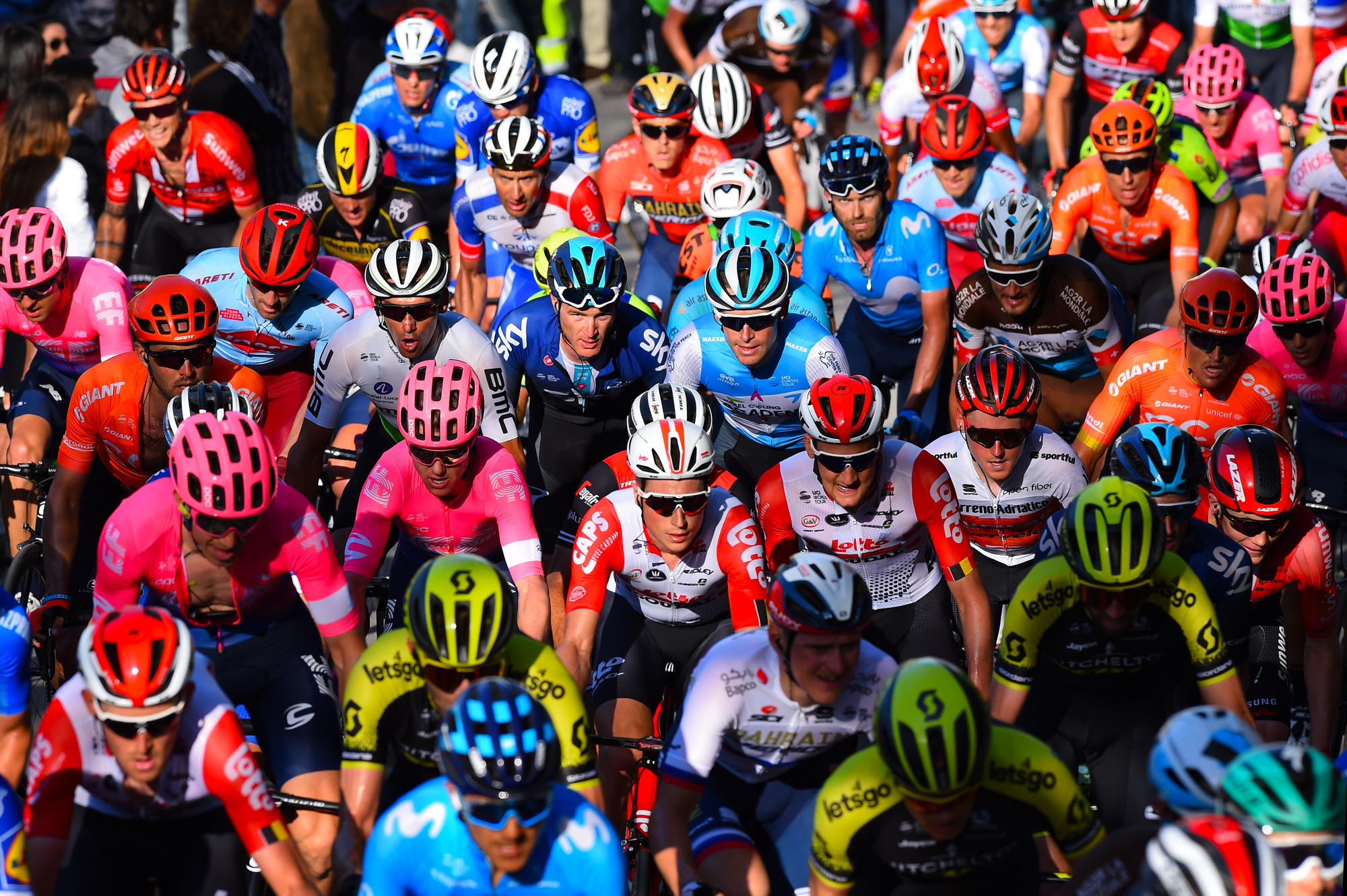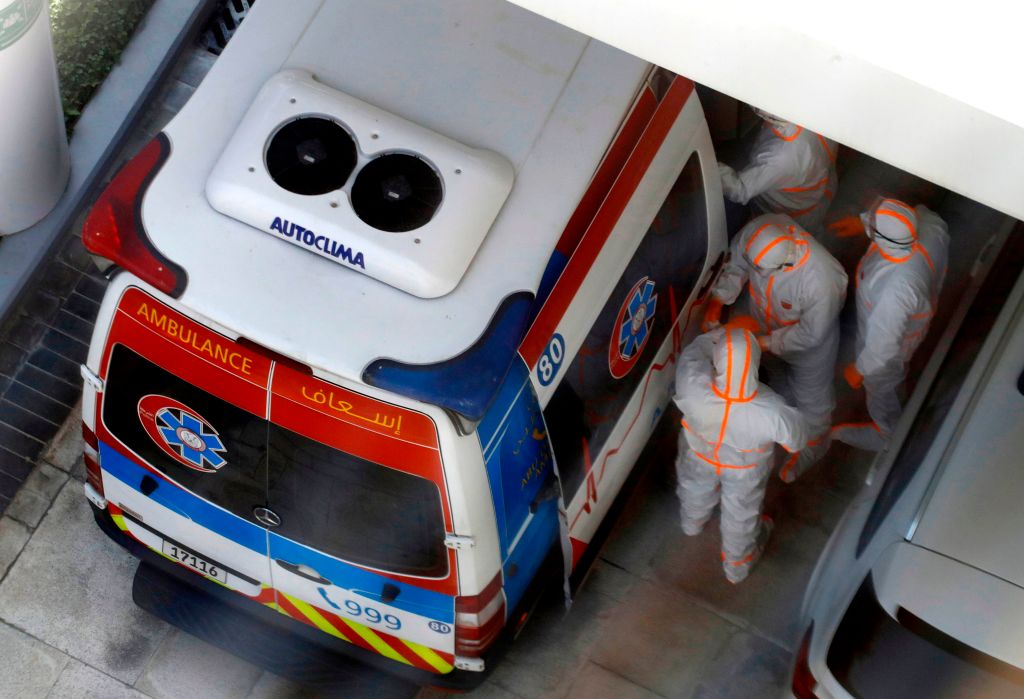UCI to enforce COVID-19 peloton and team 'bubbles' in return to racing health protocol
Local laws will apply for suspect cases during races

The UCI has published the health protocol designed to protect the health of riders and anyone involved in the rescheduled road races between late July and November, detailing mandatory, recommended or desired actions, including the creation of protective peloton and team 'bubbles' and the screening of riders before and during races.
Social distancing measures will be imposed between the peloton bubble, the team bubbles, and the race organisation staff, media and public. Race organisers must appoint a so-called COVID Coordinator and a COVID Doctor who are in charge of the protocol at the event.
The UCI warned that "the management of a suspected COVID-19 case during the race must be planned for."
Any mandatory measures such as quarantines or the suspension of a race after the emergence of a positive case will be imposed in line with the national rules applied for both suspected cases and those who have been in close contact with that person. Any suspect cases will be sent to local COVID testing centres.
"This protocol of instructions and recommendations is fundamental, especially for the teams and organisers, with a view to the resumption of cycling races," UCI President David Lappartient said.
"These measures remain dependent on the laws and measures in the different host countries and may need to be adapted but this protocol is another step towards our sport’s return to life.
"After the announcement of the calendars, we now have the framework which will enable riders to race again."
Get The Leadout Newsletter
The latest race content, interviews, features, reviews and expert buying guides, direct to your inbox!
Three general principles
The protocol is based on work done by the World Health Organisation and an international task force set up by World Athletics. It was lead by UCI Medical Director Professor Xavier Bigard and representatives of riders, teams, cycling's doctors and organisers, as well as CPA (Professional Cyclists Association) Women and Katerina Nash in her role of President of the UCI Athletes' Commission.
The UCI made it clear that the protocol is dependent on the local and national laws where races are held with the aim of reducing the risk of the COVID-19 pandemic as much as possible. It will be updated and changed as the based on the development of the global health situation and scientific understanding.
The UCI explained in a press release that the health protocol sets out three general principles:
"The first is that each team (riders, entourage, doctors) must form a "team bubble." When the race starts, the team bubbles will join to form a "peloton bubble" which must adhere to the measures adopted.
The second caters to three levels of the pandemic, and varies according to their intensity:
- "Moderate" risk level which corresponds to phase 4 of viral pandemics as defined by the WHO, with 20 to 50 Covid-19 cases declared per week per 100,000 inhabitants
- "Low" risk level (WHO phase 3 or post-peak phase of the pandemic, corresponding to fewer than 20 cases per 100,000 inhabitants)
- "Very low" risk level (WHO phase 1 and 2 or post-pandemic phase characterised by an absence of cases over a period of 3-4 weeks).

The third establishes measures considered "mandatory, recommended or desired", according to the severity of the epidemiological situation.
"The mandatory measures in all cases include the appointment by the organiser of staff in charge of the protocol at the event (a COVID Coordinator and a COVID Doctor), the screening of riders by their teams (before and during the competitions), the adaptation by the organiser of risk zones (registration, feed zones, awards ceremony), and the respect of the preventive “bubble” principle by teams at their accommodation and when travelling."
The measures and rules are then applied to different moments before, during, and after the stages and races.
Teams must test the riders and staff members in a "team bubble" for COVID-19 before a race and then follow a protocol of daily medical monitoring. Social distancing measures will be imposed and special accommodation rules will exist in team hotels.
Awards ceremonies will also be adapted, while the UCI will be responsible for a special anti-doping protocol.
The management of a suspected COVID-19 case
The possibility of a COVID-19 case emerging during a race has sparked the biggest concern amongst riders and the race entourage, especially with at least one suspected case during the final days of Paris-Nice in March.
If a COVID-19 cluster was discovered during the Tour de France, it is highly likely the race would be suspended, unless rapid tests of all the other riders and staff in the bubbles came up negative and any cases amongst the race entourage were also controlled.
In Italy, where the rescheduled WorldTour season will begin on August 1, a strict 14-day quarantine rule has existed for anyone coming into contact with a suspect COVID-19 case, causing potentially huge problems for the return of the Serie A football championship.
On Thursday, a law was finally introduced allowing for a 'soft quarantine' after the number of new daily COVID-19 cases in Italy fell to just a few hundred. Now, when a football player is now suspected of having COVID-19, they have to isolate while everyone else in a team bubble enters lockdown in a team hotel and are tested. Serie A can continue but extra-quick tests must also be carried out on match days.
Similar strict 14-day isolation rules currently apply in France according to the official government website.
The French Ligue 1 football championship was cancelled but French sports minister Roxana Maracineanu has said she is in favour of the Tour de France going ahead if health and safety conditions are respected. It is likely the French rules will be relaxed as in Italy in the weeks ahead. However, the threat of a suspected COVID-19 case remains a critical point in the safe organisation of a major races.
A football team bubble consists of around 50 players and staff. A Tour de France 'team bubble' will consist of around 25 riders and staff, but a 'peloton bubble' is made up of 22 teams of eight riders for a total of 178 riders. It is unclear if it would be possible to test all the riders and the team staff if a suspected case occurs in a team during a stage race. If it is not possible, the race would be unlikely to go on. However, the UCI specified that local and national laws would apply.
The UCI health protocol specified that if there is a suspected COVID-19 case, the team doctor makes direct contact with the dedicated COVID Doctor of the organiser’s medical team. This COVID Doctor will direct the patient to the nearest COVID Centre or specialised service.
"Mandatory measures imposed in line with the national rules will be applied for both 'suspected cases' and those who have been in close contact with that person," read the UCI statement.
"All these measures simply represent a strict application of the health regulations in force in the country, which in turn are based on the rules imposed by the WHO. The organisers must inform all the participating teams of the detailed protocol applied by the health authorities and specify the conditions of health isolation and identification of those in contact with the carrier."
The UCI publishes protocol for procedures to be followed when the 2020 season of road cycling competitions resumes https://t.co/nbAeqKVzHV pic.twitter.com/OCQaLhdESOJune 19, 2020

Stephen is one of the most experienced member of the Cyclingnews team, having reported on professional cycling since 1994. He has been Head of News at Cyclingnews since 2022, before which he held the position of European editor since 2012 and previously worked for Reuters, Shift Active Media, and CyclingWeekly, among other publications.